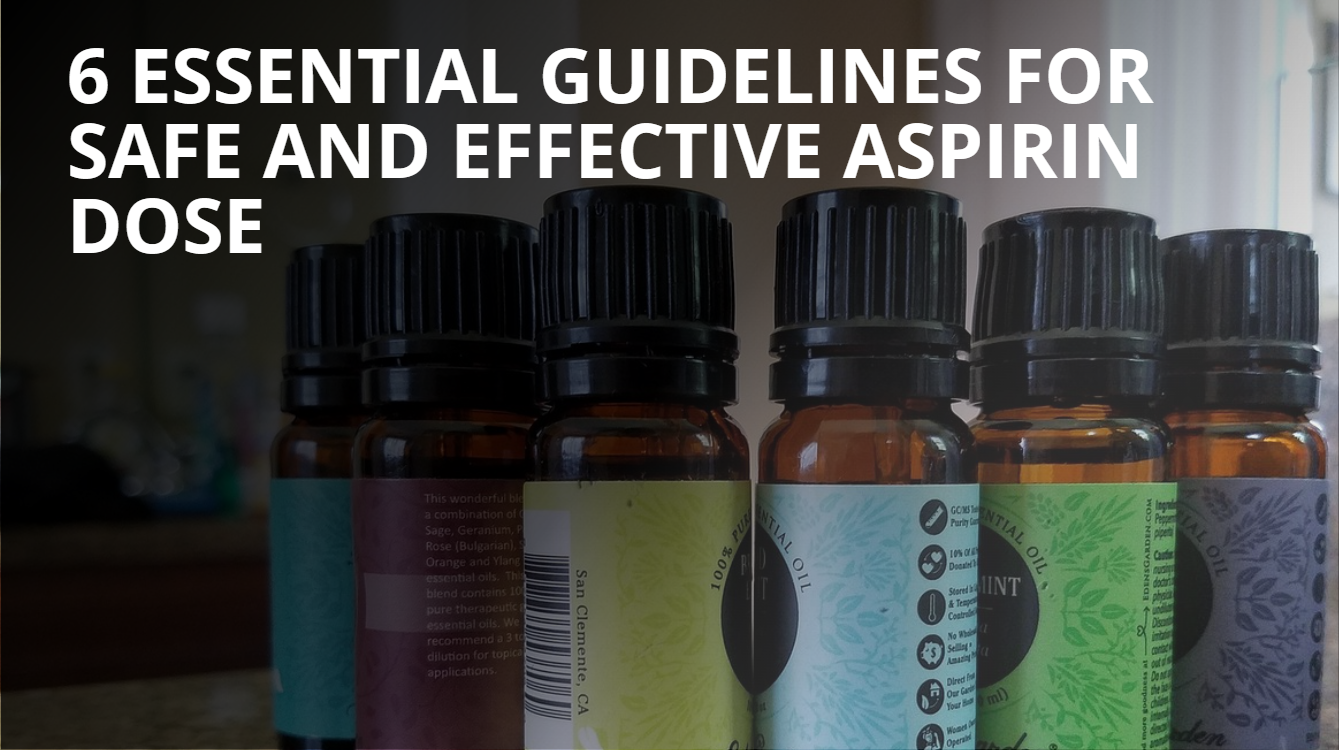Taking medication can sometimes feel like you’re tiptoeing through a minefield. You want to make sure you’re doing everything right to get the benefits without stumbling into side effects. Aspirin, that tiny pill with a big reputation, is no different. Let’s dive into the essentials of getting your Aspirin dose just right—without turning this into a medical thesis. Grab a cup of coffee (or tea if you’re fancy), and let’s get started!
1. Know When to Take It

Aspirin isn’t like candy; you can’t just pop it whenever you feel like it. Timing is everything. Morning, noon, or night? Well, that depends. For some, taking it in the morning works best. For others, it’s all about the evening ritual. The key is consistency. Pick a time and stick to it like glue. And if you forget? No, you can’t double up like it’s a missed TV episode—just take the next dose on schedule.
Why Timing Matters
The reason timing is crucial is because your body’s chemistry changes throughout the day. In the morning, your blood tends to be thicker, increasing the risk of clots. Taking Aspirin dose in the morning can help thin your blood when it’s most needed. Conversely, if you’re at risk for gastrointestinal issues, evening might be better, as lying down can help minimize discomfort.
Quick Tip:
Imagine Aspirin as your secret weapon. You wouldn’t want to misplace your lightsaber if you were a Jedi, would you?
2. The Right Dose Matters

Not all Aspirin dose are created equal. Your doctor will help you figure out whether you need a low-dose baby aspirin (81 mg) or the regular adult version (325 mg). And no, taking more doesn’t mean you’ll be healthier faster—it just means you might end up with a stomach ache.
Personalized Dosage
Your Aspirin dose can depend on several factors: age, medical history, and what you’re trying to treat or prevent. For instance, a low dose is often recommended for heart attack prevention, while higher doses might be prescribed for pain or inflammation.
Funny Thought:
Think of it like coffee. A cup is great. A pot? Not so much unless you enjoy bouncing off the walls!
Avoiding Overdose
Overdosing on Aspirin can be dangerous. Symptoms of an overdose include ringing in the ears, rapid breathing, confusion, and severe dizziness. If you suspect an overdose, seek medical attention immediately.
3. Eat Something First

Aspirin can be a bit of a diva—it doesn’t like to be taken on an empty stomach. Food helps buffer your tummy against irritation. So, grab a snack or take it with a meal. Your stomach will thank you, and you’ll avoid those nasty ulcer risks.
Importance of Food
When you take Aspirin on an empty stomach, it can increase the acidity in your digestive system, leading to discomfort or even more serious issues like gastric ulcers. Food acts as a buffer, reducing these risks.
Food Pairing:
Pair your Aspirin with a healthy snack. No, a doughnut doesn’t count as healthy. Maybe a banana or some yogurt?
Funny Anecdote:
Imagine Aspirin as a tiny, picky guest at your dinner table. It refuses to settle in unless it’s had a decent meal first.
4. Watch Out for Side Effects

No one likes a party pooper, especially when that pooper is in the form of side effects. Common ones include stomach pain, heartburn, and even some dizziness. Keep an eye out, and if anything feels off, call your doctor. You know your body better than anyone else.
Recognizing Side Effects
Understanding the potential side effects can help you catch them early. Aside from the common ones, some people might experience allergic reactions like hives, facial swelling, or difficulty breathing. If you experience these, seek emergency help immediately.
Managing Mild Side Effects
For minor side effects, sometimes adjusting the time you take your Aspirin or taking it with a bit more food can help. Always consult your doctor before making any changes.
Humorous Note:
Imagine your body sending you a text: “Hey, this Aspirin dose is giving me grief!” Don’t ignore it—respond and get some help.
5. Interactions with Other Medications
Aspirin likes to mingle, but sometimes it clashes with other medications. Blood thinners, certain antidepressants, and even some supplements can cause interactions. Be honest with your doctor about everything you’re taking—even if it’s just a daily vitamin.
Common Interactions
Blood thinners like warfarin or clopidogrel can increase the risk of bleeding when taken with Aspirin. Nonsteroidal anti-inflammatory drugs (NSAIDs) like ibuprofen can also pose risks. Even herbal supplements like ginkgo biloba can interact negatively.
Safe Practices
Always keep a list of your medications and share it with your healthcare provider. This includes over-the-counter drugs and supplements. They can help you avoid dangerous interactions.
Pro Tip:
Think of it as planning a dinner party. You wouldn’t invite your ex and your current partner to the same table without expecting some fireworks, right?
6. Follow Your Doctor’s Advice
This seems like a no-brainer, but you’d be surprised how many people play doctor at home. Your doctor knows best. They’ve studied for years and have a pretty good idea of what works and what doesn’t. Follow their advice, and don’t go rogue with your Aspirin dose.
Trust the Experts
Your doctor has the expertise to tailor the Aspirin dose to your specific needs. Whether it’s adjusting the dose, suggesting the best time to take it, or monitoring for side effects, they have the knowledge to keep you safe.
Avoid DIY Adjustments
Resist the urge to tweak your dosage based on something you read online or heard from a friend. Self-medicating can lead to complications. Always consult your healthcare provider before making changes.
Funny Anecdote:
Imagine telling your dentist how to fix your teeth. Sounds absurd, right? The same goes for your doctor—they’ve got this!
Understanding Aspirin’s Role
Aspirin is a versatile medication. It’s used for pain relief, reducing inflammation, and preventing heart attacks and strokes. Understanding how it works can help you appreciate why following the guidelines is so important.
How Aspirin Works
Aspirin inhibits the production of certain natural substances in your body that cause pain, fever, and inflammation. It also reduces the tendency of blood to clot, which is why it’s used for heart attack and stroke prevention.
Benefits and Risks
While Aspirin can be incredibly beneficial, it’s not without risks. Long-term use can lead to gastrointestinal issues, increased bleeding risk, and other complications. This is why it’s critical to follow your doctor’s guidance and use the lowest effective dose for the shortest possible time.
Aspirin for Heart Health
For many, Aspirin is a lifesaver when it comes to preventing heart attacks and strokes. However, it’s not suitable for everyone. Your doctor will consider your health history and current condition before recommending Aspirin as a preventive measure.
Aspirin for Pain and Inflammation
Aspirin is also a go-to for many types of pain, from headaches to arthritis. Its anti-inflammatory properties make it a good choice for conditions like rheumatoid arthritis. Again, the dosage and frequency will depend on your specific needs and doctor’s recommendations.
Practical Tips for Taking Aspirin
Let’s wrap up with some practical tips to ensure you’re taking your Aspirin dose effectively and safely.
Consistency is Key
Set a reminder on your phone or write it on your calendar. Consistency helps maintain steady levels of the medication in your system, maximizing its benefits.
Stay Hydrated
Drink a full glass of water with your Aspirin. This not only helps the pill go down easier but also aids in absorption and reduces the risk of stomach irritation.
Store Properly
Keep your Aspirin in a cool, dry place. Heat and moisture can affect its potency. Avoid storing it in the bathroom or near the kitchen sink.
Monitor Your Health
Keep track of any side effects or changes in your health. A journal can be a useful tool to note how you feel each day and any potential issues. Share this with your doctor during check-ups.
Conclusion
Taking the correct Aspirin dose is crucial for reaping its benefits while avoiding unnecessary risks. By following these six essential guidelines, you’re well on your way to using Aspirin safely and effectively. Remember, when in doubt, ask your doctor—they’re there to help you, not judge you. So, stay safe, stay healthy, and don’t forget to smile!
Final Thought:
And hey, next time you’re about to take your Aspirin, think of this article. A little humor goes a long way in making health decisions feel less daunting. Stay awesome and take care!
Disclaimer
The information provided on this blog regarding medicine prices and side effects is solely based on data collected from public domains. I am not a doctor or medical professional. While I strive to provide accurate and up-to-date information, I cannot guarantee the absolute accuracy or completeness of the data. It is always recommended to consult with a qualified healthcare professional or doctor for personalized medical advice and information. The content on this blog should not assume any responsibility for any consequences arising from the use of the information on this blog.
Thank you.
